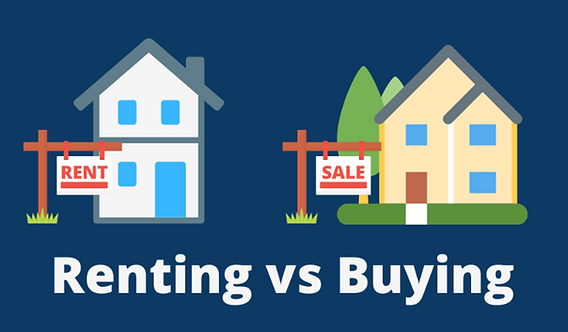One of the most important decisions people face regarding housing is whether to rent or buy a home. With today’s real estate market being more dynamic than ever, understanding the pros and cons of each option is crucial for making an informed choice. Both renting and buying come with benefits and challenges, varying based on personal circumstances, financial goals, and market conditions.
Pros of Renting
Flexibility: One of the most significant advantages of renting is flexibility. Renters typically sign leases for shorter periods—often one year or less—allowing them to relocate quickly if their job changes, they want to move to a different neighborhood, or they need to downsize or upsize quickly. Renting is an excellent choice for those uncertain about their long-term plans or in transitional life stages.
Lower Upfront Costs: Renting requires much lower initial costs compared to buying. While buyers often need to save for a down payment, closing costs, and other fees, renters typically only need to pay the first month’s rent and a security deposit. This makes renting a more accessible option for those who do not have significant savings.
Maintenance-Free Living: Renters are usually not responsible for the maintenance and repair costs associated with the property. If something breaks, the landlord is generally responsible for fixing it, saving renters time and money.
Access to Amenities: Many rental properties offer access to amenities like gyms, pools, and on-site security, which might be out of reach for homebuyers due to high upfront costs or maintenance expenses.
Cons of Renting
No Equity Building: One of the most significant downsides of renting is that monthly rent payments do not contribute toward ownership. Renters don’t build equity, meaning they don’t benefit from property appreciation or the financial gains of owning a home. Renters pay to live in someone else’s property without building wealth over time.
Limited Control Over the Property: Renters have little say in how the property is maintained or modified. For example, tenants often need permission to make changes like painting walls, remodeling rooms, or updating appliances.
Rent Increases: Rent can increase at the end of each lease term, sometimes significantly. This can create financial uncertainty and may make renting more expensive over time, especially in high housing demand.
Pros of Buying
Building Equity: One of the main advantages of buying a home is the ability to build equity. Every mortgage payment you make increases your ownership in the property. Over time, as property values rise, the value of your home may increase as well, offering the potential for financial gain.
Stability: Homeownership offers long-term stability. With a fixed-rate mortgage, your monthly payments remain constant, making it easier to budget for the future. Additionally, owning a home protects you from rising rents and the uncertainty of being a tenant.
Personalization and Control: Homeowners have the freedom to make changes to their property as they see fit. Whether renovating the kitchen, building an addition, or planting a garden, homeowners have complete control over their space.
Tax Benefits: In many cases, homeowners can benefit from tax deductions, such as mortgage interest deductions, which can reduce their overall tax burden.
Cons of Buying
High Upfront Costs: Purchasing a home requires significant upfront costs, including a down payment, closing costs, and other fees. These expenses can be a barrier for many would-be buyers, especially in high-demand markets where home prices are rising rapidly.
Maintenance Costs: Homeowners are responsible for the upkeep of their property. This includes routine maintenance, repairs, and renovations, which can be costly and time-consuming. Unexpected expenses, such as a broken HVAC system or a leaking roof, can be financially burdensome.
Market Risk: Real estate markets can fluctuate, and while property values tend to increase over the long term, there are no guarantees. If home values drop, owners may find a property worth less than what they paid, which can be financially challenging if they need to sell.
Conclusion
Choosing between renting and buying a home ultimately depends on personal circumstances and financial goals. Renting offers flexibility, lower initial costs, and fewer responsibilities, but it needs to build equity. On the other hand, buying a home provides the opportunity to build equity and enjoy long-term stability, but it comes with higher upfront costs and maintenance responsibilities. Assessing factors such as financial situation, lifestyle preferences, and long-term goals can help individuals decide to suit their needs in today’s market best.




